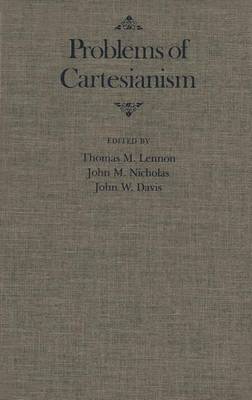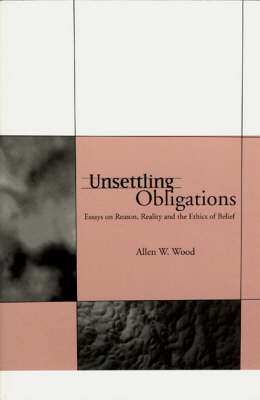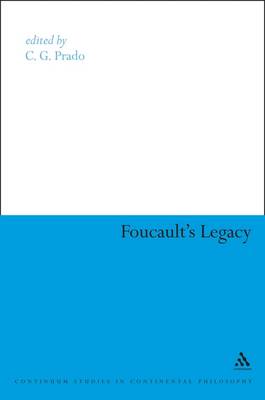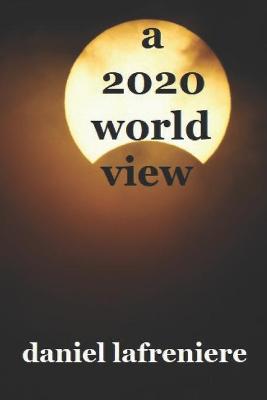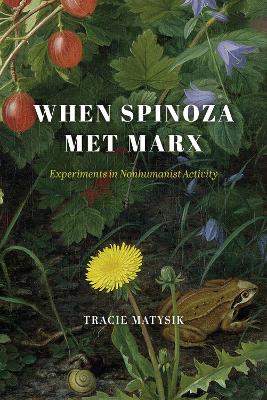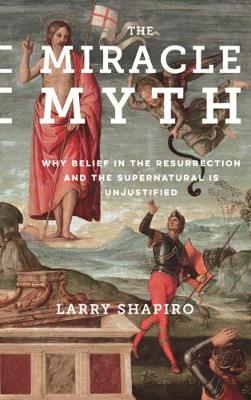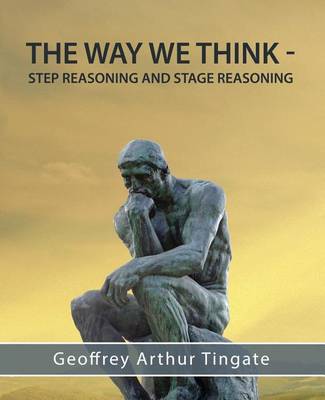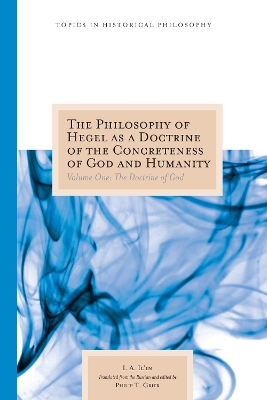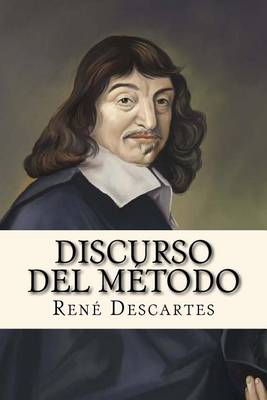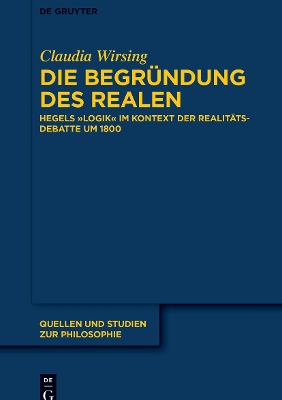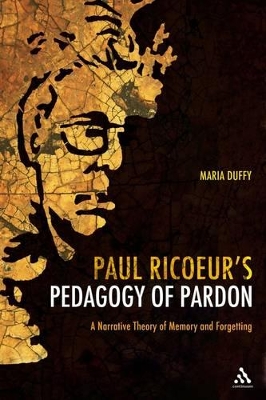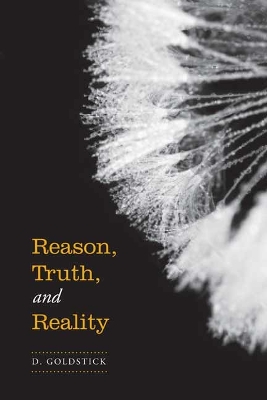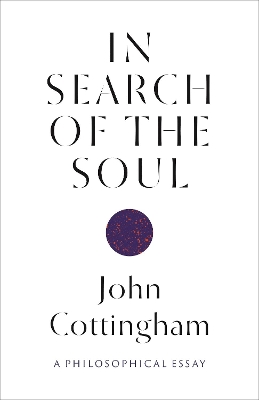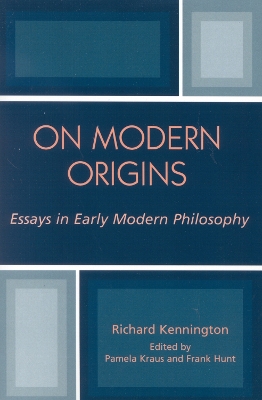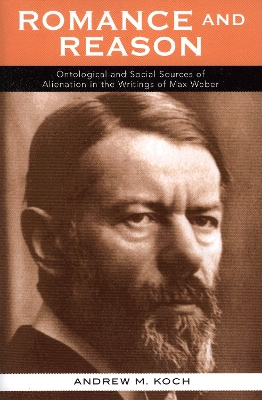Problems of Cartesianism (McGill-Queen's Studies in the History of Ideas, #1)
by Professor Thomas M Lennon
Unsettling Obligations (CSLI Lecture Notes (CSLI- CHUP)) (Lecture Notes)
by Allen W. Wood
Should we hold beliefs only insofar as they are rationally supportable? According to Allen W. Wood, we are morally obliged to do so - and yet how does this apply to religious beliefs? "Unsettling Obligations" examines these and related ethical and philosophical issues, taking and defending stances on many of them. Along with the theme of belief and evidence, other topics include an historical perspective of philosophy based on the Enlightenment rationalist tradition and a study of how our practi...
Foucault's Legacy (Continuum Studies in Continental Philosophy)
Foucault's Legacy brings together the work of eight Foucault specialists in an important collection of essays marking the 25th anniversary of Foucault's death. Focusing on the importance of Foucault's most central ideas for present-day philosophy, the book shows how his influence goes beyond his own canonical tradition and linguistic milieu. The essays in this book explore key areas of Foucault's thought by comparing aspects of his work with the thought of a number of major philosophers, includi...
Aristotle famously said that humans are rational animals and distinguished two forms or kinds of human rationality. Practical rationality strives to answer questions about how to live and about what sort of person one should be. It deals with human action and the will. Theoretical rationality strives to answer questions about the nature of our world and our place in it. It deals with human knowledge and understanding. Philosophical work on rationality attempts to understand the similarities, dif...
Nietzsche's Thus Spoke Zarathustra (Continuum Studies in Continental Philosophy)
This is a collection of essays from an international team of leading Nietzsche scholars examining arguably his most important work.Nietzsche famously regarded "Thus Spoke Zarathustra" as his greatest work. However, despite Nietzsche's pervasive influence upon the philosopher and non-philosopher alike, and his own intense regard for Zarathustra, there has been relatively little serious study of Nietzsche's magnum opus.This book seeks to address this gap in the available literature by taking "Thus...
Explores concepts that bring together the thinking of Spinoza and Marx. Karl Marx was a fiery revolutionary theorist who heralded the imminent demise of capitalism, while Spinoza was a contemplative philosopher who preached rational understanding and voiced skepticism about open rebellion. Spinoza criticized all teleological ideas as anthropomorphic fantasies, while Marxism came to be associated expressly with teleological historical development. Yet socialists of the German nineteenth-century...
There are many who believe Moses parted the Red Sea and Jesus came back from the dead. Others are certain that exorcisms occur, ghosts haunt attics, and the blessed can cure the terminally ill. Though miracles are immensely improbable, people have embraced them for millennia, seeing in them proof of a supernatural world that resists scientific explanation. Helping us to think more critically about our belief in the improbable, The Miracle Myth casts a skeptical eye on attempts to justify belief...
Free Will and Continental Philosophy (Continuum Studies in Continental Philosophy)
by David Edward Rose
Free Will and Continental Philosophy explores the concepts of free-will and self-determination in the Continental philosophical tradition. David Rose examines the ways in which Continental philosophy offers a viable alternative to the hegemonic scientistic approach taken by analytic philosophy. Rose claims that the problem of free-will is only a problem if one makes an unnecessary assumption consistent with scientific rationalism. In the sphere of human action we assume that, since action is a...
Leibniz on Purely Extrinsic Denominations (Rochester Studies in Philosophy)
by Dennis Plaisted
The philosopher Gottfried Leibniz said that one of his most important doctrines, and in fact one of the most important doctrines in all of philosophy as well as theology, is that there are no purely extrinsic denominations [NPE hereafter]. The prevailing interpretation of his views is that all extrinsic denominations [roughly relational properties] reduce to intrinsic denominations [roughly non-relational properties]. According to this reductionist view, things only have intrinsic denominations...
The Philosophy of Hegel as a Doctrine of the Concreteness of God and Humanity (Topics in Historical Philosophy, #1)
by I A Il'in
This landmark two-volume translation from Russian of The Philosophy of Hegel as a Doctrine of the Concreteness of God and Humanity marks the first appearance in English of any of the works of Russian philosopher Ivan Aleksandrovich Il'in (Ilyin). Originally published in 1918, on the eve of the Russian civil war, Il'in's commentary on Hegel marked both an apogee of Russian Silver Age philosophy and a significant manifestation of the resurgence of interest in Hegel that began in the early twentiet...
Francis Bacon is considered the father of modern science. He proposed, at his time, a great reformation of all process of knowledge for the advancement of learning divine and human. He called it Instauratio Magna (The Great Instauration). Bacon planned his Great Instauration in imitation of the Divine Work-- the Work of the Six Days of Creation, as defined in the Bible, leading to the Seventh Day of Rest or Sabbath in which Adam's dominion over creation would be restored, thus dividing the great...
Die Begrundung des Realen (Quellen Und Studien Zur Philosophie, #147)
Maria Duffy describes Paul Ricoeur's narrative theory of memory and addresses central conceptual and methodological issues in his theory of forgiveness and reconciliation. As the many Truth Commissions around the world illustrate, revisiting the past has a positive benefit in steering history in a new direction after protracted violence. A second deeper strand in the book is the connection between Ricoeur and John Paul II. Both lived through the worst period of modern European history (Ricoeur...
Dan Goldstick's Reason, Truth, and Reality addresses two questions: what sort of world do we inhabit? and what moral obligations do we have? To answer the questions Goldstick mounts a bold contemporary defense of pre-Kantian rationalism. Basing consideration upon a characterization of reason in its deductive, inductive, and ethical functioning, he asks what must hold good for reason so characterized to be a dependable guide to truth. The conclusions Goldstick draws are threefold. First of all, t...
How our beliefs about the soul have developed through the ages, and why an understanding of it still matters todayThe concept of the soul has been a recurring area of exploration since ancient times. What do we mean when we talk about finding our soul, how do we know we have one, and does it hold any relevance in today's scientifically and technologically dominated society? From Socrates and Augustine to Darwin and Freud, In Search of the Soul takes readers on a concise, accessible journey into...
On Modern Origins (Applications of Political Theory)
by Richard Kennington
Richard Kennington (1921-1999), a professor for many years at Pennsylvania State University and the Catholic University of America, was renowned for his insight in reading and teaching early modern philosophy. Although he published articles and spoke widely, never before have his writings been collected in a book. On Modern Origins deftly shows how modern thinkers assessed the errors of the classical tradition and established in its place a philosophy that fuses a new meaning of nature and of th...
In Romance and Reason Andrew Koch notes that in the annals of social research the jury is still out on Max Weber. It is for no other reason than Weber's enormous body of foundational work in sociology that he is continually undergoing several simultaneous versions of integration into contemporary social research. Whether Weber is a central, secondary, or tertiary consideration in social research it behooves any social scientist to take a position on the work of Max Weber. In this erudite new int...
